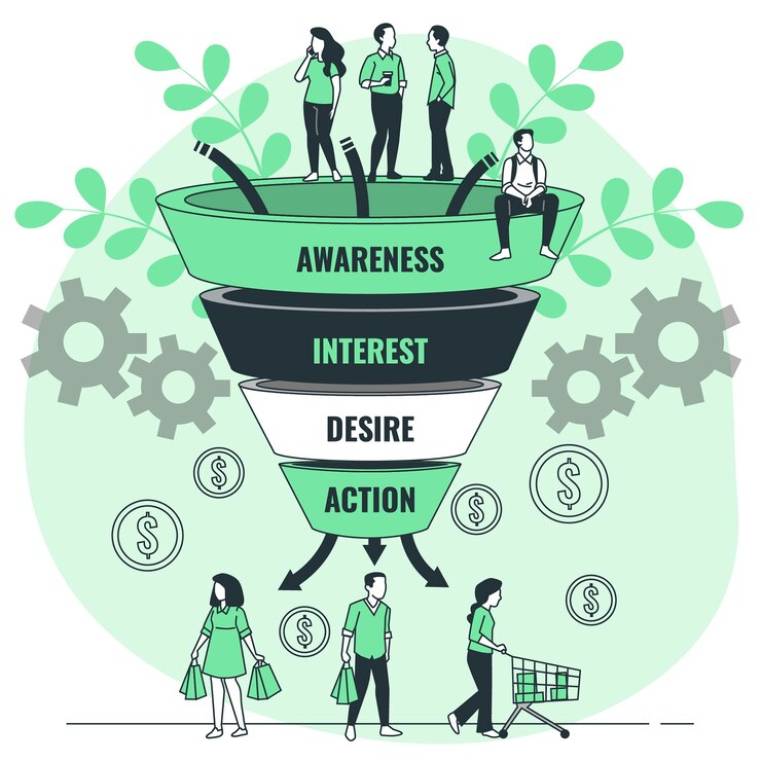Let's Talk

What is a Marketing Funnel?
A marketing funnel could be easily described as a customer journey. Namely, it is a conceptual model employed in marketing to depict the progression of potential customers as they move towards making a purchase or engaging in a desired action. Basically, it involves all the stages that lead a customer to buy a product or make the desired conversion you have set as a primary goal. These conversions can refer to making a purchase, filling out a form or signing up for a newsletter, whatever aligns with the goals of your marketing campaign or business on every occasion.
The Stages of the Marketing Funnel
The marketing funnel is based on St. Elmo Lewis’ AIDA Model, an American advertising advocate that outlined its stages into the following four:
- Awareness
- Interest*
- Desire
- Action
*The interest stage can also be recognized as the consideration stage while the action stage can also be found as conversion.
Awareness
At the top of the funnel, the goal is to create awareness about your product or brand. This is where potential customers first learn about your offering through various marketing channels like advertising, content marketing, social media, or word-of-mouth referrals. The key is to attract a broad audience.
Interest
Once potential customers become aware of your product, some will express interest. They might visit your website, engage with your social media posts, or subscribe to your newsletter to learn more. In this stage, you want to provide valuable information and content to nurture their interest, preferably through projecting your business’ best features that make it stand out amongst competitors.
Desire
The "Desire" stage in the marketing funnel is the third step where potential customers have progressed from being aware of your product or service to showing interest in it. In this stage, the primary objective is to intensify their interest and create a strong desire or need for what you're offering. Making the potential customer feel they need your product can highly increase the possibility of the following and final stage.
Action
The bottom of the funnel is where the actual conversion occurs. Prospects become paying customers by making a purchase, signing a contract, or otherwise completing the desired action. This is the ultimate goal of the funnel but it’s worth emphasising that while the ultimate goal is to reduce attrition, it's also normal for individuals to leave at various points in the process.
Next stop: Conversion Rate Optimization!
What are TOFU, MOFU and BOFU?
The TOFU/MOFU/BOFU funnel model represents an evolved version of the classic marketing funnel, specifically tailored to handle the complexities of contemporary consumer behaviour and the demand for highly focused marketing strategies. These acronyms, TOFU, MOFU, and BOFU, correspond to the stages known as Top of Funnel, Middle of Funnel, and Bottom of Funnel, respectively.
The Importance of the Marketing Funnel
The marketing funnel is of paramount importance to businesses and marketers for several compelling reasons:
- Customer Journey Understanding: The marketing funnel provides a structured framework to understand how potential customers progress from awareness to action, aiding in tailored marketing strategies for each stage.
- Marketing Effort Optimization: By tracking customers through the funnel, businesses can pinpoint drop-off points and hesitations, enabling marketers to optimise efforts, address bottlenecks, and improve conversion rates.
- Marketing ROI Measurement: The funnel allows for measuring the effectiveness of marketing campaigns and analysing conversion rates at each stage to determine which channels and strategies yield the best results, facilitating efficient resource allocation.
- Personalization: Knowing where customers are in the funnel enables personalised messaging and offers, enhancing the customer experience and increasing the likelihood of conversion.
- Customer Relationship Building: Beyond purchase, the funnel emphasises post-purchase engagement, crucial for long-term success and loyalty, as loyal customers tend to make repeat purchases and become brand advocates.
- Enhanced Customer Experience: Addressing unique customer needs at each stage provides a seamless and informative experience, improving conversion rates and fostering a positive brand image.
- Sales and Marketing Alignment: The funnel serves as a common framework aligning sales and marketing efforts, ensuring both teams collaborate effectively to convert leads into customers.
- Strategic Decision-Making: Businesses can make informed strategic decisions based on funnel data, focusing on the most effective strategies for growth.
Invest in your Tailor-Made marketing strategy today!
The marketing funnel is a powerful tool for guiding marketing efforts, from building initial brand awareness to converting potential leads into paying customers. By understanding and optimising each stage, you can fine-tune your marketing strategy, improve your ability to connect with your target audience and ultimately increase your conversion rates. It's important to note that the marketing funnel is not a one-size-fits-all solution. Its effectiveness relies on continuous adaptation and customization to suit the unique preferences and needs of your audience. So, use this knowledge, experiment, and refine your approach to create a funnel that aligns perfectly with your business objectives.
